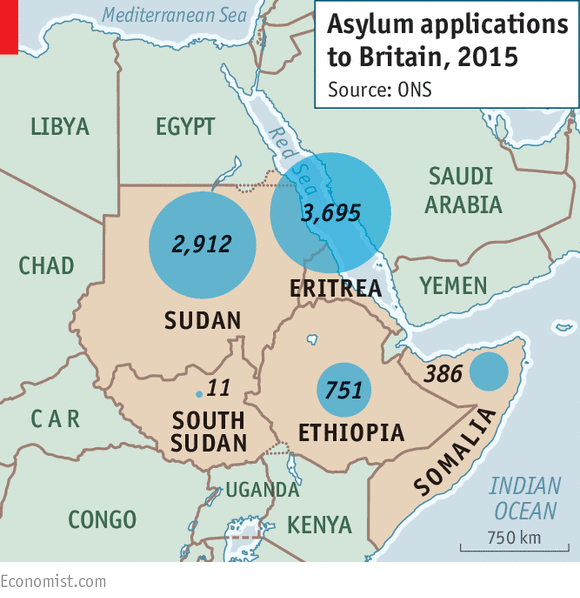IT WAS no surprise that Theresa May chose to focus on immigration and Europe’s refugee crisis during her inaugural addresses to the UN on September 20th. She made her reputation at the Home Office as a tough gatekeeper dedicated to keeping the numbers of migrants down (even as they rose relentlessly). As her words at the UN demonstrated, she is now beefing up her predecessor’s policy to deal with the unprecedented flow of refugees from the Middle East and Africa by tackling the problem at source—or at least en route—before migrants have to be plucked out of the Mediterranean Sea or processed by Britain’s creaking asylum system.
Date: Mon, 3 Oct 2016 22:39:36 +0200
British domestic politics clash with human rights in the Horn of Africa
The policy sounds humane, as well as politically wise. But there is mounting concern that Britain and its EU partners will be propping up some of the most toxic regimes in Africa instead.
The Khartoum Process, as the initiative is known, was launched in 2014 as a partnership between European and African states. The aim is to stem the flow of migrants to Europe by giving money to “transit” countries to police their borders and catch people-traffickers, as well as providing more aid to end the conflicts that produce refugees in the first place. Britain chairs the Khartoum Process’s steering committee and provides money for it, both through the EU and unilaterally. About €700m ($785m) from the EU has been set aside. To the same end Mrs May has announced a further £103m ($134m) for South Sudan; 100 British troops are also joining a UN peacekeeping force in the country.
The worry is that a lot of this money may end up in the hands of governments which Britain and the EU regularly criticise for torturing and killing their own citizens. The British government says none of the money will go through government structures. But in many of the countries in question the government is so pervasive that it is almost impossible to separate it from private companies and NGOs. Lutz Oette of the School of Oriental and African Studies in London says that the Khartoum Process lacks transparency, so it will be hard to trace where the money is spent.
The main concern is Sudan, whose president, Omar al-Bashir, has been indicted by the International Criminal Court for genocide over his army’s assaults in Darfur; the conflict has left at least 300,000 dead. Britain and the EU would prefer to see Mr Bashir in The Hague than in government, but as Sudan is such a big transit route for refugees (see map) it is now one of the main partners in the Khartoum Process, which is named after its capital. As Lady Cox, a veteran human-rights campaigner, argues, this gives “credibility and resources to the Khartoum government while it carries on with its barbaric policies”. She says that Western condemnation of the government’s bloody offensives in Darfur and other provinces have become muted since Sudan agreed to help with the migration plan.

Money to help patrol Sudan’s borders will go to its corrupt and brutal police force, which has itself been implicated in people trafficking. Worse, the government has deployed the dreaded Rapid Support Force, successor to the paramilitaryjanjaweed that laid waste to Darfur, to patrol the Libyan border and round up Eritrean and Ethiopian refugees. They will not be treated with the dignity that Mrs May might want.
Furthermore, Sudan is not just a “transit” country for refugees. Action by government forces and militias has created millions more (about 2.8m in Darfur and over 100,000 there in the first six months of this year), many of whom have tried to come to Britain. Officials argue that the Khartoum Process is at least worth pursuing to open up a dialogue on forced migration and related issues. But there is little evidence from the past to suggest that Mr Bashir’s regime will mend its ways.